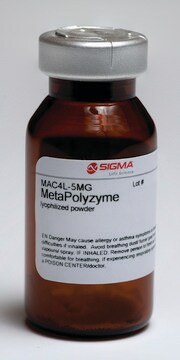SAE0196
Achromopeptidase from bacteria
free of DNA contaminants, suitable for Microbiome research
Sinónimos:
Bacterial Protease
About This Item
Productos recomendados
biological source
bacterial
Quality Level
form
lyophilized powder
specific activity
≥1000 U/mg
feature
DNA free
technique(s)
DNA extraction: suitable
suitability
suitable for cell lysis
application(s)
cell analysis
shipped in
ambient
storage temp.
−20°C
General description
Application
The study of microbial communities has been revolutionized in recent years by the widespread adoption of culture independent analytical techniques such as 16S rRNA gene sequencing and metagenomics. Since DNA contamination during sample preparation is a major problem of these sequence-based approaches, DNA extraction reagents free of DNA contaminants are essential. This product undergoes strict quality control testing to ensure the absence of detectable levels of contaminating microbial DNA using 35 cycles PCR amplification of 16S and 18S rDNA using universal primer sets.
Biochem/physiol Actions
Features and Benefits
Free of detectable microbial DNA, ensuring the accuracy of metagenomics and other culture-independent sequencing methods
Undergoes strict quality control testing to ensure the absence of detectable levels of contaminating microbial DNA
Optimum pH of 8.5-9 allows for use in a wide range of microbiome studies
Unit Definition
signalword
Danger
hcodes
pcodes
Hazard Classifications
Resp. Sens. 1
Storage Class
11 - Combustible Solids
wgk_germany
WGK 3
flash_point_f
Not applicable
flash_point_c
Not applicable
Certificados de análisis (COA)
Busque Certificados de análisis (COA) introduciendo el número de lote del producto. Los números de lote se encuentran en la etiqueta del producto después de las palabras «Lot» o «Batch»
¿Ya tiene este producto?
Encuentre la documentación para los productos que ha comprado recientemente en la Biblioteca de documentos.
Artículos
Enzymatic cell lysis and protoplast prep processes demystified, revealing complex enzymatic reactions during sample preparation.
Enzymatic cell lysis and protoplast prep processes demystified, revealing complex enzymatic reactions during sample preparation.
Enzymatic cell lysis and protoplast prep processes demystified, revealing complex enzymatic reactions during sample preparation.
Enzymatic cell lysis and protoplast prep processes demystified, revealing complex enzymatic reactions during sample preparation.
Nuestro equipo de científicos tiene experiencia en todas las áreas de investigación: Ciencias de la vida, Ciencia de los materiales, Síntesis química, Cromatografía, Analítica y muchas otras.
Póngase en contacto con el Servicio técnico








